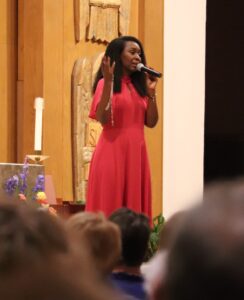Immaculée Ilibagiza, a survivor of the Rwandan genocide, was a recent guest speaker at two Diocesan Parishes, sharing her story of survival built upon her strong faith.
Holding a rosary, Ilibagiza spoke to hundreds at Epiphany Cathedral in Venice on Feb. 13, 2023, recounting her harrowing experiences during the Rwandan Genocide of 1994, but her message was one of love and forgiveness.

“Mine is a message of love,” Ilibagiza said. “You can hate, or you can love. Life is your gift, and it is up to you how you choose to use it… Every day I wake up to use my life for something beautiful and to touch other human beings – love heals. When you care for another, you get love back. To love or to hate, to uplift or to pull down, to be kind or to be mean, if you choose love, I am with you.”
Raised a devout Catholic, her world, and that of her family, village, and country, were torn apart when the Rwandan president’s plane was shot down in April 1994. The assassination of the Hutu president triggered a genocide during which more than 1 million minority Tutsi tribe members were massacred. Ilibagiza hid in a 3×4 foot bathroom with seven other women for 91 days before being able to find safety at a nearby refugee camp.
During her time in hiding, Ilibagiza was first filled with anger and despair, hearing the rampaging hordes destroy the world she had known. Ilibagiza’s father was a prominent leader in the town and ordered her to hide in the home of a Hutu pastor, someone he trusted. Before sending her into hiding, he gave his daughter a rosary.

She prayed the rosary as a way to drown out the anger that was inside her and the evil that was outside. This was not always easy, as a key part of the prayer is reciting the Lord’s Prayer, and she had a hard time saying– “forgive those who trespass against us.” When she was finally able to say the prayers without hesitation, it was that turning point towards God and away from hate that saved Ilibagiza.
“Anytime I come to share I get so excited,” Ilibagiza said. “It’s not speaking about how terrible things were, it is to share the love of God and to share with you the lessons I have learned.”
Ilibagiza said she often wakes up at night to pray, times that remind her that: “Wow! God, you were there during that horrible situation. He was there then, and He is here now. And He will be with us in the future. To know without a shadow of a doubt that God is real –those who truly believe in God can be the ones who have true hope, because God can do anything.”
She was almost spared the horror of the genocide but was home for Easter break from university when her world devolved into chaos overnight.
Praying the rosary helped the young woman to focus her thoughts on Our Lady and the Lord during a time when her mind, body and spirit were being pushed to the limits in that small bathroom with the other women. There was constant fear that every sound, every movement might alert someone to their hiding spot and end their lives in a horrible way.
Ilibagiza emerged from that small bathroom weighing just 65 pounds and finding that in addition to her family, a million of her extended family, friends, neighbors and fellow Rwandans had been massacred.
After the genocide, Ilibagiza came face-to-face with the man who killed her mother and one of her brothers. After enduring months of physical, mental and spiritual suffering, she was still able to offer the unthinkable, telling the man, “I forgive you.”
She said that moment could have caused her to reignite the hatred that she had felt, but through the intercessions of the Virgin Mary and the Lord, her heart had truly been changed and forgiveness and love were the order of the day.
Ilibagiza is now an American citizen and has written several books about her experiences during the Rwandan Genocide and speaks internationally to share her story of survival, love and faith. This also included a presentation at St. William Parish in Naples on Feb. 14.





